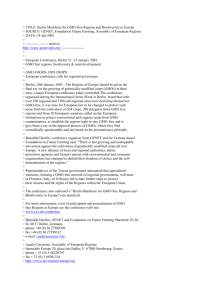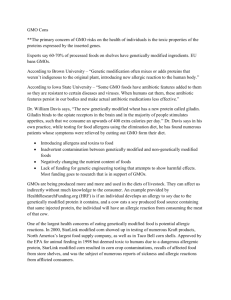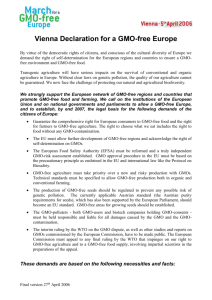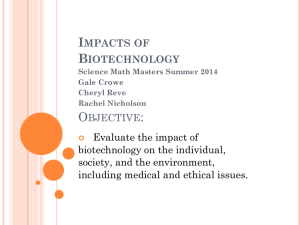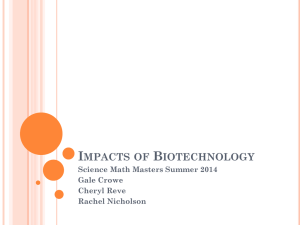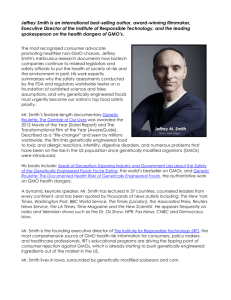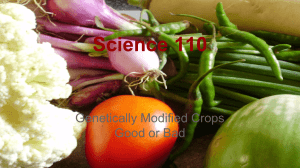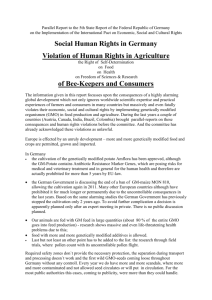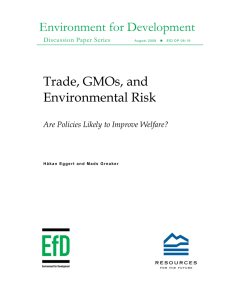the full report on GMO Free Regions (doc.).
advertisement
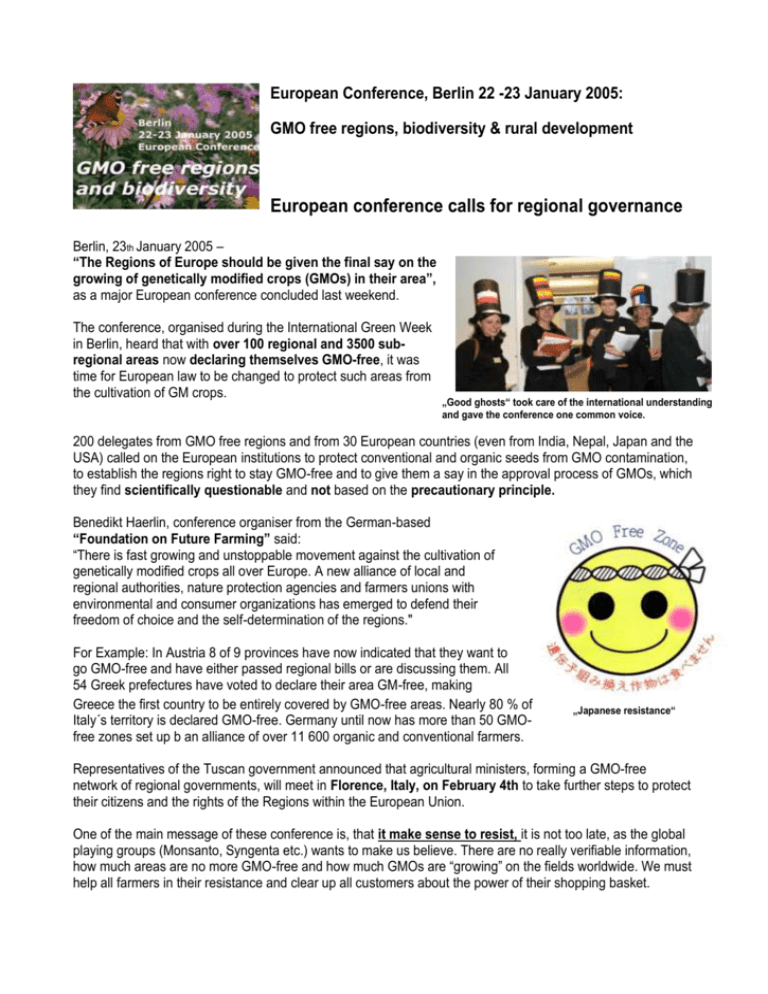
European Conference, Berlin 22 -23 January 2005: GMO free regions, biodiversity & rural development European conference calls for regional governance Berlin, 23th January 2005 – “The Regions of Europe should be given the final say on the growing of genetically modified crops (GMOs) in their area”, as a major European conference concluded last weekend. The conference, organised during the International Green Week in Berlin, heard that with over 100 regional and 3500 subregional areas now declaring themselves GMO-free, it was time for European law to be changed to protect such areas from the cultivation of GM crops. „Good ghosts“ took care of the international understanding and gave the conference one common voice. 200 delegates from GMO free regions and from 30 European countries (even from India, Nepal, Japan and the USA) called on the European institutions to protect conventional and organic seeds from GMO contamination, to establish the regions right to stay GMO-free and to give them a say in the approval process of GMOs, which they find scientifically questionable and not based on the precautionary principle. Benedikt Haerlin, conference organiser from the German-based “Foundation on Future Farming” said: “There is fast growing and unstoppable movement against the cultivation of genetically modified crops all over Europe. A new alliance of local and regional authorities, nature protection agencies and farmers unions with environmental and consumer organizations has emerged to defend their freedom of choice and the self-determination of the regions." For Example: In Austria 8 of 9 provinces have now indicated that they want to go GMO-free and have either passed regional bills or are discussing them. All 54 Greek prefectures have voted to declare their area GM-free, making Greece the first country to be entirely covered by GMO-free areas. Nearly 80 % of Italy´s territory is declared GMO-free. Germany until now has more than 50 GMOfree zones set up b an alliance of over 11 600 organic and conventional farmers. „Japanese resistance“ Representatives of the Tuscan government announced that agricultural ministers, forming a GMO-free network of regional governments, will meet in Florence, Italy, on February 4th to take further steps to protect their citizens and the rights of the Regions within the European Union. One of the main message of these conference is, that it make sense to resist, it is not too late, as the global playing groups (Monsanto, Syngenta etc.) wants to make us believe. There are no really verifiable information, how much areas are no more GMO-free and how much GMOs are “growing” on the fields worldwide. We must help all farmers in their resistance and clear up all customers about the power of their shopping basket. The main issue of GMOs in our seed, crop and food, is not only a question of healthy nutrition or sustainable rural development, it is primarily an existentially question of democratic decision making. We have to be clear in our mind, that one of the crucial difference between chemical and “biological” pollution is, that latter is able to proliferate by itself and, if the worst comes to the worst, is irreversible! So, we should not leave the decision about GMOs in our environment, only to a handful of companies and governments! A lot of informations and „networking“ during the conference. 27.01.2005, Glonn Sabine Brückmann Tip: There is a very informative, advisable movie “Life running out of control” (about genfood an designer babies) from Bertram Verhaag. More informations mail @denkmal-film.com. For more information of the conference, a list of participants and presentations of GMO free Regions in Europe see at the conference web-site www.zs-l.de/conference or: Foundation on Future Farming Benedikt Haerlin Marienstr.19-20 D-10117 Berlin Germany phone +49 (0) 30 27590309 fax +49 (0) 30 27590312 http://www.zs-l.de/conference e-mail: conference@zs-l.de European Network on Genetic Engineering Hartmut Meyer In den Steinäckern 13 D - 38116 Braunschweig Germany phone +49 (0) 531 5168746 fax +49 (0) 531 5168747 http://www.genet-info.org Assembly of European Regions Agnès Ciccarone Immeuble Europe 20, place des Halles F- 67000 Strasbourg France phone + 33 (0) 3 88220707 fax + 33 (0) 3 69201318 http://www.are-regions-europe.org The conference also endorsed a “Berlin Manifesto for GMO-free Regions and Biodiversity in Europe”. Draft "Berlin Manifesto for GMO-free Regions and Biodiversity in Europe" Our land, our future, our Europe The regions of Europe have the right to determine their own ways of farming, eating, producing and selling food and of protecting their environment and landscapes, their culture and heritage, their seed, their rural development, their economic future. This includes the right to decide about the use of genetically modified plants and animals in their agriculture and ecosystems. Our choice We all share the fundamental human right to chose what we eat. Choices about the use of reproductive material in a common environment cannot be made individually, as they affect all people sharing these commons. Decisions about the use of genetically modified organisms (GMOs) and the shape of our landscape should be made democratically in the regions and not be imposed by individual farmers, bureaucrats or companies. Decisions can be wrong and thus should be open for change and reversal. Our seed The local diversity of seeds and native varieties and their wild relatives is the foundation for a regions unique composition of taste and the heritage of a region and is the basis for further innovation and development of seed. Protecting and encouraging the conservation and breeding of native and adapted local varieties and the integrity of farm saved seed is an important duty and right of regional agricultural policy. As seeds reproduce there can be no thresholds for any unlabelled GM contamination of non-GM conventional, organic and traditional varieties. Our agricultural diversity Agri-Culture is an important part of our regional way of life. Socio-economic and cultural impacts must be taken into account when introducing agro-technologies such as GMO. Most European regions have made the promotion of sustainable and organic farming and regional marketing priorities for their rural development. Where the right to farm without GMOs and without undue changes to the local agricultural practice can not be guaranteed, the introduction of GMOs must be prevented. Our natural diversity The shape of Europe's environment and landscapes, including its protected areas, is the result of thousands of years of human cultivation. Protection of the enormous wealth of different natural environments, landscapes and eco-systems can only be achieved by those who share this common heritage. Safeguarding them from the spread and introgression of GM varieties is a conservation goal in itself. Our safety and precaution Science can be wrong, but GMOs cannot easily be recalled, if unexpected detrimental effects occur. Hence the regions have the right to follow the precautionary principle on GMO release. Our food sovereignty and labels Most Europeans don't want GM-food. To serve this demand is part of a region's food sovereignty and an important economic chance. Regional authorities must be able to protect quality labels, purity standards, organic production and designations of origin at competitive prices. This includes access to GMO free animal feed. Our co-existence In many cases and for some species there is no realistic chance for coexistence between GM and non-GM farming, just as there is none between silence and noise in a room. The highest standards of protection are required for native local cultivars and their wild relatives. The level of protection and standards of coexistence, including their costs, must be assessed and decided upon locally and regionally. Fair and sustainable co-existence must prevail between neighbours and economic partners. It must not be forced upon their traditional practices and future development. Our Europe The diversity of regions shapes the identity of Europe. In a global economy we do need common European standards on food safety, transparency, liability, environmental and nature protection and market access. They should be designed to serve and not to suppress the local and regional self-determination of the people of Europe. We will defend these rights and duties and the beauties and joys of our regions throughout Europe.
